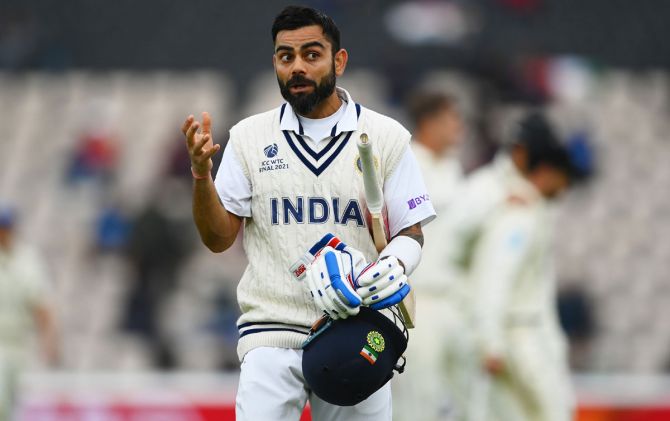 | « Back to article | Print this article |

The breakdown in communication between national selectors, led by chairman Chetan Sharma, and the team management comprising skipper Virat Kohli over Bengal opener Abhimanyu Easwaran's contentious selection, is not the first such instance in Indian cricket.
And it is certainly not going to be the last one either in the country's cricketing history, which is replete with incidents when alpha male captains have locked horns with the wise men of authoritarian reputation.
It's not a bad time to revisit a few selection conundrums that had gained legendary status over the years.
In the late 1960s till early 70s, Bengal had a wicketkeeper of Parsi origin named Rusi Jeejebhoy, a handsome man born and brought up in Kolkata. He played 46 first-class games and ended with a lowly batting average of 10.46.
Even if one considers that batting wasn't a primary skill for wicketkeepers back then, Farokh Engineer was in a different league.
There was a slot for the third wicketkeeper for the historic 1971 tour of West Indies and there was a Duleep Trophy match where East was led by stylish Bihar batsman Ramesh Saxena and Daljit Singh (famous for being BCCI chief curator in later years) was supposed to keep. They were playing a Duleep Trophy game at the Brabourne Stadium sometime in 1970.
"The chairman of selection committee, late Vijay Merchant (an icon of Parsee community) just before the toss summoned Ramesh bhai, a nice gentleman.
"He instructed Ramesh bhai to play Daljeet as a batsman and pick Rusi as a keeper. If someone of Mr Merchant's stature would request, what could have Ramesh bhai done," an old-timer who was part of that match said.
Jeejeebhoy's inclusion forced a former India and Mumbai great (his son was also a Test cricketer), known for his sharp sense of humour, to joke: "I only knew about Batliboi (Engineering company), now I am hearing about Jeejeebhoy!"
Jeejeebhoy kept wickets and was selected for his first and last tour of West Indies and when he retired, his highest score was a mere 39 in 46 games. New skipper Ait Wadekar couldn't have argued with a living legend like Merchant.
Sambaran Banerjee, the only Bengal captain to win Ranji Trophy post independence, is an amazing raconteur. With an elephant's memory, he can just rattle off incidents both from his playing days and during his times as a national selector.
Banerjee recollected how he was literally told that he was going to England in 1979 along with Surinder Khanna, but it was Tamil Nadu's Bharat Reddy (career average of under 18), who eventually got the nod. Coincidentally, then India skipper S Venkataraghavan also hailed from Tamil Nadu.
"We knew Kiri (Syed Kirmani) would be dropped. A day before the team selection, few players came up and said, 'Sambaran we know you are in the squad, we need a treat.
"I must have spent around 400 bucks (quite a sum in those days) to take a few boys out for dinner and next day, the list had Reddy's name. I think he scored 30-odd runs in four Tests," one could gauge the hurt in Banerjee's voice as he spoke.
Banerjee claims that while South Zone selector M L Jaisimha and North's Vijay Mehra was in his support, Dattu Phadkar, the East Zone selector, kept quiet and Venkataraghavan apparently got his choice of keeper.
In 1986, Manoj Prabhakar was in the Indian team and before the Leeds Test match, skipper Kapil Dev felt that he wasn't measuring up in the nets (years later it happened with Karun Nair in 2018).
"Jimmy Amarnath was entrusted with the duty to call up Madan Lal, who by then was semi-retired from Tests and playing club cricket in England and ask him to join the team. Prabhakar, till date, hasn't forgotten the snub from Kapil, who could convince selectors that Lal was better than Prabhakar."
But Banerjee's greatest achievement was winning the battle of wits to get Sourav Ganguly in the Indian team for tour of England in 1996. Captain Mohammed Azharuddin was dead against Ganguly's inclusion, and so was then coach Sandeep Patil.
"I got support from Vishy (chairman of selectors Gundappa Viswanath) and Rungta (Central Zone) to get Sourav in as bowling all-rounder. Azhar was seething in rage but the simple 3-2 vote prevailed.
"I remember when Ganguly's name was announced by Vishy at Taj Palace, Delhi, some journalists started hooting but Vishy being the gentleman explained why he got the nod."
During the 1997 Sahara Cup, one of the most hilarious selections happened. The then skipper Sachin Tendulkar and the team management wanted Madhya Pradesh all-rounder Jai Prakash (JP) Yadav in the team and convenor of selection committee, late Jyoti Bajpai of UP, conveniently sent his state's Jyoti Prakash (JP) Yadav to Toronto, but the latter never got to play a match.
The historic 2001 Australia series was equally dramatic as skipper Ganguly went against the selection committee comprising Madan Lal and Ashok Malhotra, who wanted Sarandeep Singh in the team. Ganguly's choice was a young Harbhajan Singh. The rest is history.
In 2003-04, reporters sitting on the Chinnaswamy turf witnessed skipper Ganguly and then chairman of selectors Syed Kirmani having a long debate over who would be second keeper -- Karnataka's (Kirmani's state) Thilak Naidu or Bengal (Ganguly's state) Deep Dasgupta. The powerful skipper prevailed.
In 2011, Mahendra Singh Dhoni summoned his friend, Rudra Pratap Singh, then holidaying in Miami, to the Test team. RP's first ball went to the keeper on three drops. He never played Test cricket again.
Clearly, Indian cricket has not seen the last of the Abhimanyu Easwaran episode.